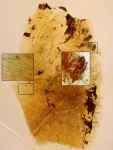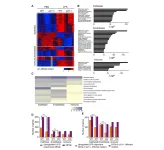(Press-News.org) ABSTRACT: 3431
ORLANDO, Fla. ― A new study led by researchers at The University of Texas MD Anderson Cancer Center discovered that co-occurring mutations in three tumor suppressor genes – KEAP1, SMARCA4 and CDKN2A – are linked with poor clinical outcomes in patients with KRAS G12C-mutant non-small cell lung cancer (NSCLC) treated with the KRAS G12C inhibitors adagrasib or sotorasib.
The findings were presented today at the American Association for Cancer Research (AACR) Annual Meeting 2023 and published in Cancer Discovery, a journal of the AACR. This study, which encompasses the largest cohort to date of patients with KRAS G12C-mutant NSCLC treated with either agent, provides a framework for clinicians and scientists to stratify patients by predicted clinical outcomes and to develop more effective treatment strategies for those unlikely to benefit from KRAS G12C inhibitors alone.
“KRAS G12C inhibitors have revolutionized the care of patients with lung cancer, but we see non-uniform clinical outcomes when these drugs are used as single agents,” said lead author Marcelo V. Negrao, M.D., assistant professor of Thoracic/Head and Neck Medical Oncology. “Therefore, it is important to understand biomarkers and to define subgroups of patients that will have better outcomes from single-agent therapy as well as patients that will require a different treatment strategy.”
The KRAS protein is responsible for regulating normal cell growth and proliferation, but activating mutations drive abnormal growth and cancer development. KRAS is the most common oncogenic driver of non-squamous NSCLC, with mutations found in 25-30% of patients. The KRAS G12C mutation is found in approximately 13% of cases. Both adagrasib and sotorasib are approved by the Food and Drug Administration to treat patients with advanced KRAS G12C-mutant NSCLC following failure of at least one prior line of standard systemic therapy.
Unfortunately, while many patients benefit from these targeted therapies, most do not achieve durable disease control from either agent as a monotherapy. Thus, the median progression-free survival (PFS) for patients treated with either drug is approximately 6-7 months, Negrao explained.
To better understand molecular factors associated with response or resistance to KRAS G12C inhibitors, the researchers assembled a cohort of 424 patients from 21 centers in the U.S. and Europe, who were treated with single agent adagrasib or sotorasib. Across all patients, the overall response rate (ORR) was 34% and the median PFS was 5.2 months. There were no significant associations between outcomes and the specific KRAS G12C inhibitor used.
The researchers compared patients with distinct clinical outcomes to adagrasib and sotorasib, including those with durable benefit (PFS of at least 6 months) and those with early progression (PFS of 3 months or less). An unbiased analysis of co-occurring mutations in each group revealed that mutations in KEAP1, SMARCA4 and CDKN2A were significantly enriched in patients with early progression. Mutations in each gene were independently associated with significantly shorter PFS and overall survival. In contrast, mutations in STK11 and TP53 – two frequently mutated genes – did not appear to be associated with outcomes to either drug.
When assessed together, mutations in KEAP1, SMARCA4 and CDKN2A were present in about one-third of patients in the cohort and accounted for approximately half of those who exhibited early disease progression with single agent KRAS G12C inhibitors. These three genes routinely are sequenced with current tumor profiling panels, so this knowledge can be used to readily stratify patients into groups with distinct clinical outcomes, Negrao explained.
In an exploratory analysis, co-mutations in genes involved with DNA damage repair and the ATRX/DAXX pathway were associated with improved outcomes, whereas additional alterations in RAS genes and mutations in PI3K/AKT/MTOR pathway genes were linked with inferior outcomes. However, these mutations were less prevalent in this cohort and require additional investigation.
“This study establishes the co-mutational landscape of early disease progression with KRAS G12C inhibitor monotherapy, and it provides a blueprint for personalizing treatment approaches with distinct combination strategies,” said presenter and senior study author Ferdinandos Skoulidis, M.D., Ph.D., associate professor of Thoracic/Head and Neck Medical Oncology. “Going forward, we plan to dig deeper into these molecularly defined subgroups and try to identify the best individualized therapeutic strategy for each group of patients.”
Skoulidis notes this study has helped to form rational hypotheses about which treatment strategies might work best in each subgroup. MD Anderson researchers are actively engaged in developing new KRAS G12C inhibitor-based combination therapies as well as novel immunotherapy approaches as a next step to address unmet needs for these patients.
This research was supported by the National Institutes of Health/National Cancer Institute (1R01 CA262469-01, P30 CA016672, T32-GM07019), MD Anderson’s Lung Cancer Moon Shot®, Rexanna’s Foundation for Fighting Lung Cancer, the Elva J. and Clayton L. McLaughlin Fund for Lung Cancer Research, Team Stuie and LUNGSTRONG, and the German Center for Lung Research. A full list of collaborating authors and their disclosures can be found with the full paper here.
- 30 -
END
AACR: Mutations in three key genes associated with poor outcomes in lung cancer patients treated with KRAS G12C inhibitors
Study provides framework for personalizing treatment approaches and developing combination strategies for KRAS G12C-mutant lung cancer
2023-04-17
ELSE PRESS RELEASES FROM THIS DATE:
Scientists create powerful, most-accurate tools to research deadliest blood cancer, study says
2023-04-17
New York, NY (April 17, 2023) — Tisch Cancer Center scientists have developed unique models of the deadliest blood cancer, acute myeloid leukemia (AML), creating a transformative resource to study this cancer and eventually its drug response and drug resistance. The models were described in a late-breaking abstract at the annual meeting of the American Association of Cancer Research and simultaneously published in Blood Cancer Discovery, a journal of the American Association for Cancer Research.
These are the first powerful models that are ...
EMBARGOED: Two brain networks are activated while reading, study finds
2023-04-17
When a person reads a sentence, two distinct networks in the brain are activated, working together to integrate the meanings of the individual words to obtain more complex, higher-order meaning, according to a study at UTHealth Houston.
The study, led by Oscar Woolnough, PhD, postdoctoral research fellow in the Vivian L. Smith Department of Neurosurgery with McGovern Medical School at UTHealth Houston, and Nitin Tandon, MD, professor and chair ad interim of the department in the medical school, was published ...
The surprising science behind long-distance bird migration
2023-04-17
AMHERST, Mass. – A team of scientists led by researchers at the University of Massachusetts Amherst has recently made a surprising discovery, with the help of a wind tunnel and a flock of birds. Songbirds, many of which make twice-yearly, non-stop flights of more than 1,000 miles to get from breeding range to wintering range, fuel themselves by burning lots of fat and a surprising amount of the protein making up lean body mass, including muscle, early in the flight. This flips the conventional wisdom ...
Fossils reveal the long-term relationship between feathered dinosaurs and feather-feeding beetles
2023-04-17
New fossils in amber have revealed that beetles fed on the feathers of dinosaurs about 105 million years ago, showing a symbiotic relationship of one-sided or mutual benefit, according to an article published in Proceedings of the National Academy of Sciences of the United States of America today*.
The main amber fragments studied, from the Spanish locality of San Just (Teruel), contain larval moults of small beetle larvae tightly surrounded by portions of downy feathers. The feathers belonged to an unknown theropod dinosaur, either avian (a term referring ...
Sea-level rise in southwest Greenland as a contributor to Viking abandonment
2023-04-17
Vikings occupied Greenland from roughly 985 to 1450, farming and building communities before abandoning their settlements and mysteriously vanishing. Why they disappeared has long been a puzzle, but a new paper from the Department of Earth and Planetary Sciences (EPS) determines that one factor – rising sea level – likely played a major role.
“There are many theories as to what exactly happened” to drive the Vikings from their settlements in Greenland, said Marisa J. Borreggine, lead author of the “Sea-Level ...
SWOG researchers report results in rare gynecologic cancers from DART immunotherapy trial
2023-04-17
Results from the S1609 DART clinical trial, which tested an immunotherapy combination of ipilimumab plus nivolumab in 53 cohorts of patients with rare cancers, are being reported for five cohorts of patients who had rare gynecologic cancers.
In three of those five cohorts – the cohorts for clear cell ovarian cancer; small cell ovarian carcinoma, hypercalcemic type; and non-epithelial ovarian cancer – some patients have shown durable responses to the immunotherapy, including several patients whose complete remissions have now lasted more than three years.
The findings will be presented in three abstracts at the 2023 ...
Can you describe a sensation without feeling it first?
2023-04-17
Blind or colorblind people can describe colors and use expressions like “green with envy” or “feeling blue.” A hearing-impaired person can also say those same vibrant hues are “loud.” But many linguists and cognitive neuroscientists have assumed that somatosensation—touch, pain, pressure, temperature, and proprioception, or the sense of where your body is oriented in space—is fundamental for understanding metaphors that have to do with tactile sensations. Understanding expressions like “she is having a tough time” or “that class was hard,” it was believed, requires previous experience with those sensations to extend ...
p21 facilitates chronic lung inflammation via epithelial and endothelial cells
2023-04-17
“Our results implicate p21 as a critical regulator of chronic bronchitis and a driver of chronic airway inflammation and lung destruction.”
BUFFALO, NY- April 17, 2023 – A new research paper was published on the cover of Aging (listed by MEDLINE/PubMed as "Aging (Albany NY)" and "Aging-US" by Web of Science) Volume 15, Issue 7, entitled, “p21 facilitates chronic lung inflammation via epithelial and endothelial cells.”
Cellular senescence is a stable state of cell cycle arrest that regulates tissue ...
International clinical trial conducts head-to-head comparison of open versus minimally invasive surgery for early-stage cervical cancer
2023-04-17
COLUMBUS, Ohio – Gynecologic surgeons with The Ohio State University Comprehensive Cancer Center – Arthur G. James Cancer Hospital and Richard J. Solove Research Institute (OSUCCC – James) are leading an international clinical trial to determine whether minimally invasive surgery robotic surgery is better or worse than open surgery when performing a radical hysterectomy to treat cervical cancer.
Although minimally invasive and robotic-assisted surgery techniques have become the standard approach for many surgeries, in gynecologic cancer open surgery – which involves one ...
nPOD honors Estefania Quesada Masachs for type 1 diabetes discoveries
2023-04-17
LA JOLLA, CA—La Jolla Institute for Immunology (LJI) Instructor Estefania Quesada Masachs, M.D., Ph.D., has won the 2023 Young Investigator of the Year Award from the Network for Pancreatic Organ donors with Diabetes (nPOD). This prestigious award recognizes Quesada Masachs' groundbreaking research in type 1 diabetes.
Quesada Masachs says she was "happily surprised" to receive the award from nPOD at their 2023 conference. The organization provides pancreatic tissue samples to researchers, opening the door for in-depth research into type 1 diabetes, an autoimmune disease where the body's own immune ...
LAST 30 PRESS RELEASES:
A kaleidoscope of cosmic collisions: the new catalogue of gravitational signals from LIGO, Virgo and KAGRA
New catalog more than doubles the number of gravitational-wave detections made by LIGO, Virgo, and KAGRA observatories
Antifibrotic drug shows promise for premature ovarian insufficiency
Altered copper metabolism is a crucial factor in inflammatory bone diseases
Real-time imaging of microplastics in the body improves understanding of health risks
Reconstructing the world’s ant diversity in 3D
UMD entomologist helps bring the world’s ant diversity to life in 3D imagery
ESA’s Mars orbiters watch solar superstorm hit the Red Planet
The secret lives of catalysts: How microscopic networks power reactions
Molecular ‘catapult’ fires electrons at the limits of physics
Researcher finds evidence supporting sucrose can help manage painful procedures in infants
New study identifies key factors supporting indigenous well-being
Bureaucracy Index 2026: Business sector hit hardest
ECMWF’s portable global forecasting model OpenIFS now available for all
Yale study challenges notion that aging means decline, finds many older adults improve over time
Korean researchers enable early detection of brain disorders with a single drop of saliva!
Swipe right, but safer
Duke-NUS scientists identify more effective way to detect poultry viruses in live markets
Low-intensity treadmill exercise preconditioning mitigates post-stroke injury in mouse models
How moss helped solve a grave-robbing mystery
How much sleep do teens get? Six-seven hours.
Patients regain weight rapidly after stopping weight loss drugs – but still keep off a quarter of weight lost
GLP-1 diabetes drugs linked to reduced risk of addiction and substance-related death
Councils face industry legal threats for campaigns warning against wood burning stoves
GLP-1 medications get at the heart of addiction: study
Global trauma study highlights shared learning as interest in whole blood resurges
Almost a third of Gen Z men agree a wife should obey her husband
Trapping light on thermal photodetectors shatters speed records
New review highlights the future of tubular solid oxide fuel cells for clean energy systems
Pig farm ammonia pollution may indirectly accelerate climate warming, new study finds
[Press-News.org] AACR: Mutations in three key genes associated with poor outcomes in lung cancer patients treated with KRAS G12C inhibitorsStudy provides framework for personalizing treatment approaches and developing combination strategies for KRAS G12C-mutant lung cancer





